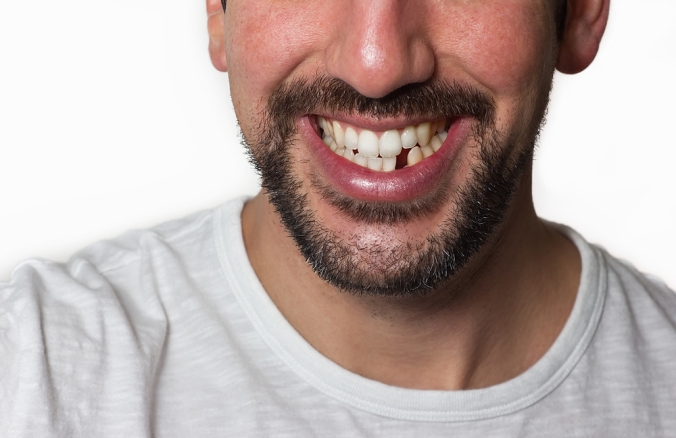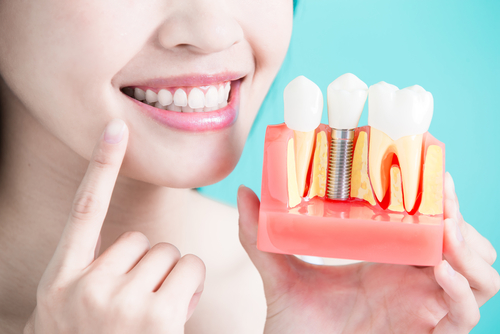
Tooth loss is a common issue in adults, and often a byproduct of aging. According to research from the National Institute of Dental and Craniofacial Research, adults age 20 to 64 have an average of 25 or fewer teeth remaining (out of 32), and nearly four percent have no remaining teeth.1 The truth is, tooth loss doesn’t have to be quite so prevalent. In many cases, tooth loss can be prevented with good oral hygiene habits, regular and professional dental care and avoiding or improving certain risk factors.
Poor Oral Hygiene
You have probably heard about the importance of proper oral hygiene throughout your life, and there’s good reason for that. By not brushing your teeth multiple times a day and flossing at least once, you put your teeth at a much higher risk for periodontal disease, cavities, tooth decay and accumulation of harmful plaque. These conditions are the primary causes of tooth loss.
Gum Disease
As mentioned previously, periodontal, or gum disease, is a major cause of tooth loss in adults. The American Academy of Periodontology estimates that three out of four American adults experience some level of gum disease, yet three percent don’t seek treatment.2
Gum disease often comes in three phases. Gingivitis, which is milder, is characterized by swollen and bleeding gums, bad breath and receding gum line. Periodontitis and advanced periodontitis, which are more severe, can be identified by spaces developing between the teeth, loose-feeling teeth when biting, misaligned teeth and buildup of pus between the teeth and gums.
Avoiding the Dentist
Having “no need,” no insurance and busy schedules are the top three reasons people avoid going to the dentist, according to the American Dental Association.3 Regardless, children and adults should visit the dentist every six months. Even if your teeth seem healthy, regular visits help prevent smaller issues from becoming larger issues, which could be the difference between tooth loss and saving a tooth before it’s too late.
Poor Diet
Along with oral hygiene, you probably have heard all about how much sugary foods can destroy your teeth. There’s good reason for that also! It’s not just candy and soda that can harm your pearly whites, however. Highly acidic foods, foods rich in carbohydrates and alcoholic beverages are known to have similar effects as sugar when it comes to tooth decay. You don’t have to completely curb sugary treats and pasta, though. Just be sure to take care of your teeth when you partake.
Trauma
Tooth trauma can be unavoidable, especially when playing certain sports like hockey, football and boxing. It’s important, however, that anyone who experiences oral trauma seeks professional medical attention shortly afterward, even if the injury doesn’t appear serious. Weeks or even years later, complications from a fractured root, such as infection, can surface, which can lead to tooth loss when left untreated.
Bruxism
More commonly known as grinding your teeth, bruxism can be mild or severe. In more severe cases, it can cause excessive tooth damage and may lead to tooth loss. Many people grind their teeth subconsciously, so be on the lookout for symptoms such as jaw or neck pain, increased tooth sensitivity, headaches, worn tooth enamel and fractured, chipped or loose teeth.
Osteoporosis
This disease causes low bone density, primarily in menopausal women. When the jaw becomes fragile or less dense, tooth loss can occur as a result. Keeping up with regular dental treatment is one way of minimizing the chance of tooth loss in osteoporosis sufferers.
Risk Factors
Risk factors aren’t necessarily causes, but they do increase the likelihood of tooth loss, primarily due to the increased risk for gum disease. Some of the main risk factors associated with tooth loss include:
- Smoking – Smokers are twice as likely to develop gum disease due to a weakened immune system, which has a more difficult time fighting-off bacteria in plaque.4
- Diabetes – Like smokers, those with diabetes are more likely to develop periodontal disease due to a less effective immune system.
- Eating disorders – Bulimia and anorexia increase acid levels inside the mouth, which over time, break down tooth enamel, cause cavities and eventually, could cause tooth loss.
- Rheumatoid arthritis – There’s a link between rheumatoid arthritis and periodontal disease, primarily because the medication used for RA reduces the effectiveness of the immune system.5
Prevention
Though certain causes and risk factors may be out of your control, many can be managed, which ultimately helps prevent tooth loss. Quitting smoking, cutting back on sweets, brushing your teeth after every meal, flossing every day and scheduling regular teeth cleanings are just a handful of changes you can make to reduce your risk of gum disease and subsequent tooth loss. If you play contact sports, always wear protective gear like helmets and mouth guards.
Dental Implants in Louisville
In certain cases, tooth loss is unavoidable or the signs may have been identified too late. In those unfortunate instances, dental implants, which replace missing teeth with natural-looking permanent teeth, may be the perfect solution!
To find out if you’re a good candidate for dental implants, contact the implant experts at Greater Louisville Oral & Maxillofacial Surgery Associates to schedule an initial office visit. Call (502) 459-8012 or visit us online today!
 As we age, we start to lose teeth here and there due to genetic predisposition, disease or poor hygiene. Around 120 million Americans are missing at least a single tooth, and 36 million have no teeth at all.1 In other words, this is a highly common problem affecting more than a third of the country.
As we age, we start to lose teeth here and there due to genetic predisposition, disease or poor hygiene. Around 120 million Americans are missing at least a single tooth, and 36 million have no teeth at all.1 In other words, this is a highly common problem affecting more than a third of the country.